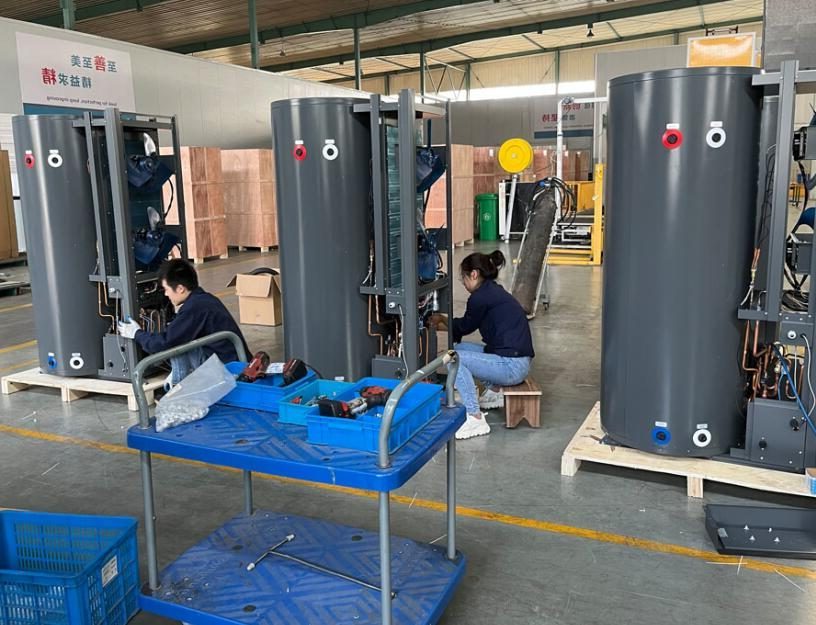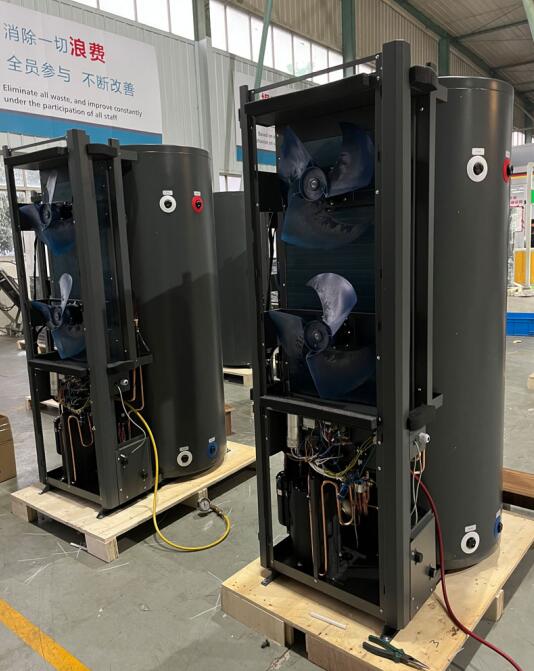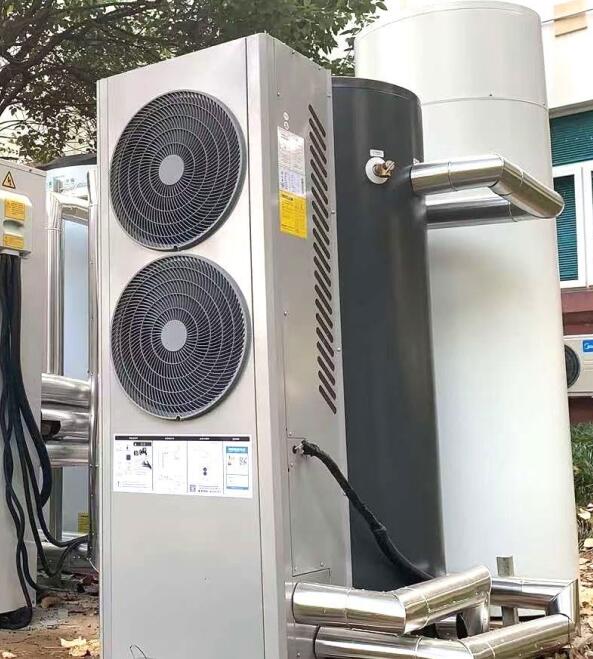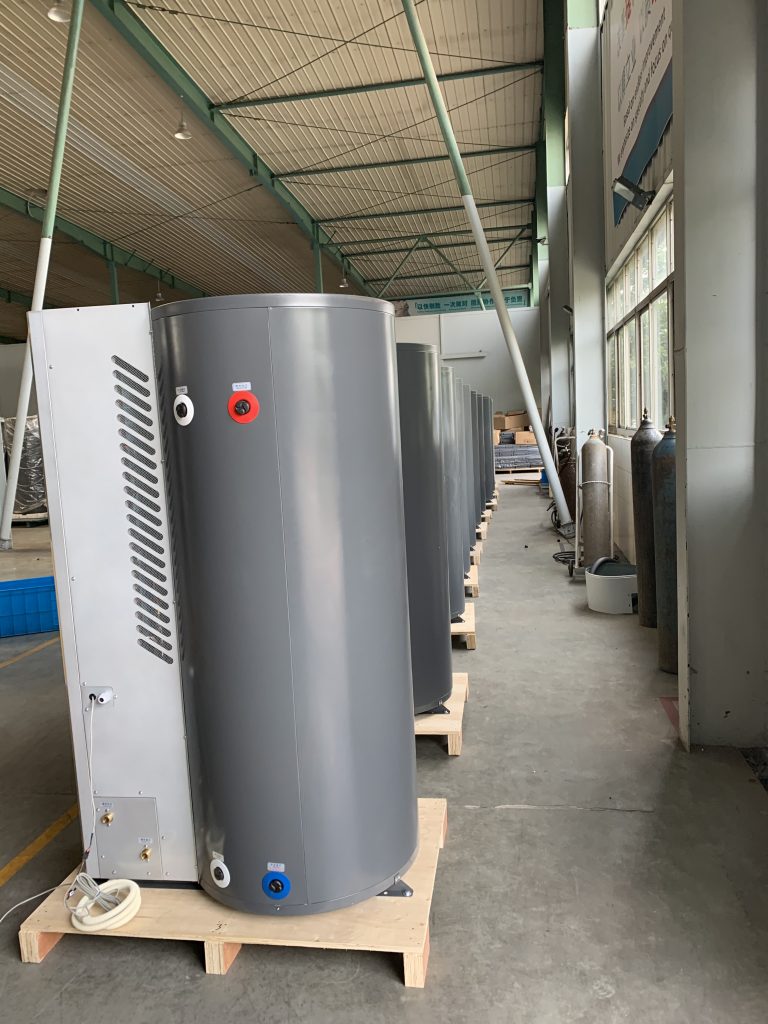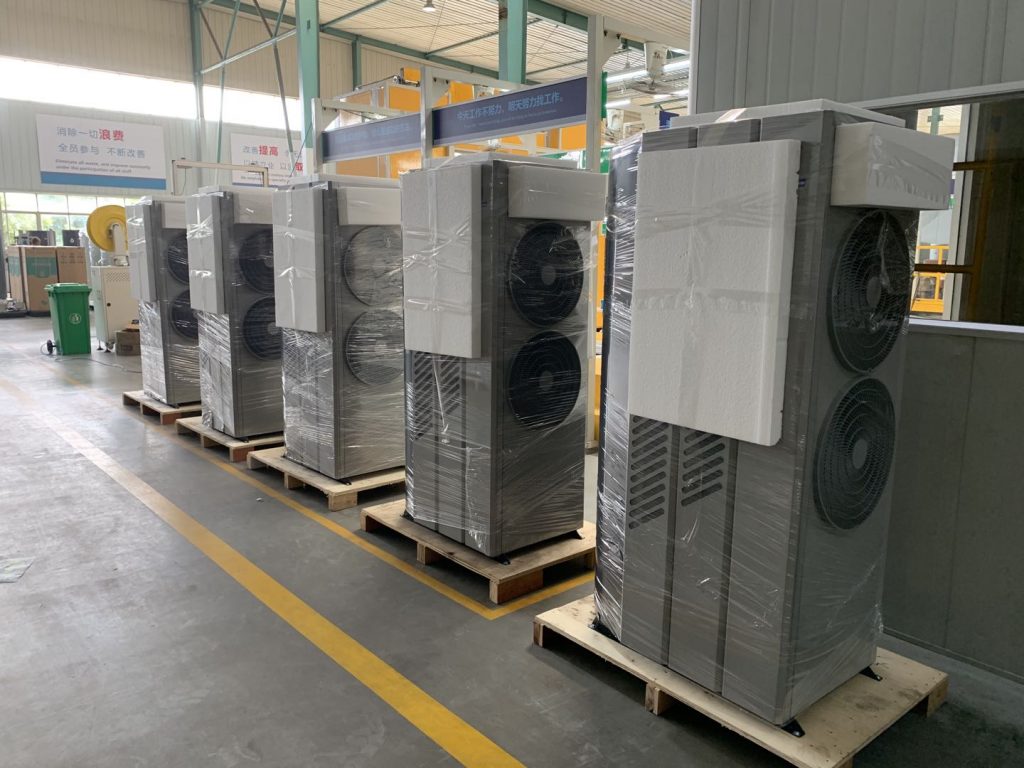Bomba de calor ar-água R134a As bombas de calor ar/água com fluido refrigerante R134a têm se tornado cada vez mais populares nos últimos anos devido à sua alta eficiência energética e ao baixo impacto ambiental. De acordo com um estudo de caso conduzido pela Comissão Europeia, as bombas de calor ar-água que usam R134a tiveram um COP de 3,2, o que as torna altamente eficientes na transferência de calor do ar externo para a água usada para aquecimento.
Além disso, o R134a tem um baixo potencial de aquecimento global e de destruição da camada de ozônio, o que o torna uma opção mais ecológica. Embora existam refrigerantes alternativos disponíveis, o R134a continua sendo uma opção econômica e confiável para sistemas de bomba de calor ar-água. Neste blog, exploraremos os benefícios do uso do R134a em sistemas de bomba de calor ar-água e como ele pode ajudar a reduzir o consumo de energia e as emissões de carbono.
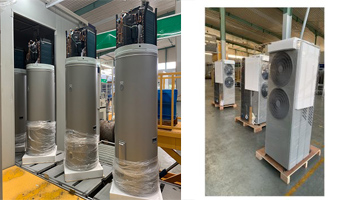
- Pose integral ou dividida opcional
- Tecnologia de sistema de aquecimento de dois estágios
- Pode operar a uma temperatura ambiente de -35C
- Funções: 80℃ água quente, aquecimento da casa/água quente doméstica, desinfecção da água
- Alto COP, segurança com economia de energia
- Tecnologia de alto desempenho em baixas temperaturas ambientes
- Tecnologia de descongelamento inteligente
- Proteção múltipla, longa vida útil
- Controle eficiente do EEV
-Instalação flexível
-Alto retorno sobre o investimento
-Aplicações em vários projetos
-Trocador de calor personalizado FANTÁSTICO de alta eficiência
- Alta eficiênciaProjeto anticongelamento e congelamento na parte inferior do rebreather especial
| Modelo | KRS118B-350V | KRS118B-420V |
| Capacidade do tanque | 350L | 420L |
| Material do tanque interno | Aço esmaltado (Aço BTC340R, 2,5 mm de espessura) | Aço esmaltado (Aço BTC340R, 2,5 mm de espessura) |
| Carcaça externa | Aço galvanizado pintado | Aço galvanizado pintado |
| Pressão nominal de trabalho do tanque | 0,8MPa | 0,8MPa |
| Grau de impermeabilidade | IPX4 | IPX4 |
| Condensador | Trocador de calor de microcanais | Trocador de calor de microcanais |
| Potência do elemento elétrico | 2500W | 2500W |
| Entrada nominal da bomba de calor | 1300W | 1300W |
- Aquecimento da casa, casa antiga com radiador e substituição do aquecedor a gás ou elétrico antigo.
- Apartamento, Vilas, Hotel.
- Uso especial em hospitais ou oficinas.
- Fazenda de laticínios, fábrica de chapas elétricas.
- Desinfecção de alimentos, secagem, lavanderia e assim por diante.
Qual é o preço da bomba de calor ar-água?
Na realidade, os aquecedores de água elétricos de fonte de ar são responsáveis por uma média de 18% de suas despesas com eletricidade, de acordo com o site strength.gov. aquecedor de água elétrico com bomba de calor Quanto mais antigo for o seu aquecedor de água, menos energia verde terá suas milhas.
Se cada residência nos Estados Unidos usasse um aquecedor de água com bomba de calor (com menos de cinquenta e cinco galões), a economia financeira da taxa de energia chegaria a $eight.2 bilhões de dólares por ano, de acordo com a megastar das energias renováveis.
Os aquecedores de água quente com bomba de calor (híbridos) custam de $1,200 para tanques de 50 galões a $2,500 para tanques de oitenta galões fabricados pelos melhores fabricantes de cessar. segurança de sua casa O tamanho do tanque e o produto excepcional influenciam mais a taxa da unidade. A partir de 2021, temperatura inicial da água, o aquecedor de água de resistência comum de 50 galões custa $400, enquanto um aquecedor de água comum de 50 galões com bomba de calor custa $1100.
É recomendável que um especialista instale seu aquecedor de água com bomba de calor de alta temperatura para que a tecnologia do sistema de aquecimento de dois estágios maximize sua eficiência elétrica. De acordo com o HomeAdvisor, os fabricantes chineses de aquecedores de água com bomba de calor residenciais novos cobram uma taxa comum de instalação de aquecedores de água em torno de $seven hundred a $900
O que é o R134a e como ele funciona em sistemas de bomba de calor ar-água?
O R134a é um fluido refrigerante de hidrofluorcarbono comumente usado em sistemas de bomba de calor ar-água. É uma escolha popular devido à sua alta eficiência energética, estabilidade térmica e baixo impacto ambiental. O R134a funciona absorvendo o calor do ar externo e transferindo-o para a água, que é então circulada pelo sistema de aquecimento do edifício.
Um estudo de caso conduzido pela Comissão Europeia constatou que o R134a é um refrigerante eficaz para sistemas de bomba de calor ar-água. O estudo examinou o desempenho das bombas de calor R134a em um edifício residencial na Espanha durante um período de três anos. Os resultados mostraram que as bombas de calor foram capazes de manter temperaturas internas confortáveis e, ao mesmo tempo, reduzir o consumo de energia e as emissões de gases de efeito estufa.
Além de seus benefícios de desempenho, o R134a também está amplamente disponível e é relativamente barato em comparação com outros refrigerantes. Ele tem um baixo potencial de destruição da camada de ozônio e um potencial de aquecimento global de apenas 1.300, o que é significativamente menor do que outros refrigerantes, como o R410A.
Quais são os benefícios de usar o R134a em sistemas de bomba de calor ar-água?
Há vários benefícios em usar o R134a em sistemas de bomba de calor ar-água. Em primeiro lugar, o R134a tem uma alta classificação de eficiência energética, o que significa que ele pode transferir efetivamente o calor do ar externo para a água usada para aquecimento. Isso pode resultar em contas de energia mais baixas e emissões de carbono reduzidas.
Além disso, o R134a tem um baixo impacto ambiental em comparação com outros refrigerantes. Ele tem um baixo potencial de aquecimento global e de destruição da camada de ozônio, o que o torna uma opção mais ecológica.
Um estudo de caso conduzido pela Comissão Europeia constatou que as bombas de calor ar-água que usam R134a tinham um COP de 3,2, o que significa que elas eram capazes de produzir 3,2 unidades de calor para cada 1 unidade de energia consumida. Essa é uma classificação altamente eficiente e demonstra a eficácia do R134a em sistemas de bombas de calor ar-água.
De modo geral, os benefícios do uso de sistemas de bomba de calor de fonte de ar de alta temperatura R134A incluem alta eficiência energética, baixo impacto ambiental e custo-benefício.
Há alguma alternativa ao uso do R134a em sistemas de bomba de calor ar-água?
Sim, há várias alternativas ao uso do R134a em sistemas de bomba de calor ar-água, incluindo o R407C, o R410A e o R32. Esses refrigerantes podem oferecer maior eficiência energética ou menor impacto ambiental, mas também têm seu próprio conjunto de vantagens e desvantagens que devem ser consideradas.
A bomba de calor de cabelo para água é mais cara?
A resistência comum de 50 galões de alta eficiência energética custa $4200, enquanto um aquecedor de água de 50 galões com bomba de calor resfriada a ar custa $1100. O valor ambiental da unidade, porém, esse preço de aquecedor de água com bomba de calor a ar no atacado tem preços operacionais mais baixos, e o consumidor residencial comum pode economizar $800 em seus pagamentos de energia após 4 anos.
É possível usar o R134a em uma bomba de calor?
As bombas de calor de médio e grande porte geralmente utilizam o R134a como refrigerante. No entanto, em comparação com o NH3 (amônia), o R134a tem menor capacidade de desempenho. Isso se deve à sua pressão relativamente baixa, o que resulta em um volume maior que o compressor precisa manipular. Como consequência, o R134a não é particularmente econômico em termos de eficiência.
Posso usar o R134a em vez do HFC 134a?
Como fica evidente nas informações fornecidas, o R134a e o HFC134a são duas substâncias distintas, mas possuem propriedades físicas praticamente idênticas e podem ser usados de forma intercambiável. Tanto o R134a quanto o HFC134a têm valor zero de ODP (potencial de destruição da camada de ozônio), o que indica que não contribuem para a destruição da camada de ozônio.
Bomba de calor ar-água r134a Fotos e vídeos
uma bomba de calor ar-água é mais barata do que um aquecedor
Em comparação com todas as outras formas comuns de aquecimento, uma bomba de calor ar-água importante é o sistema de aquecimento mais econômico e eficiente em termos de energia.
Desvantagens de uma bomba de calor ar-água r134a?
Os hpwhs requerem um tempo relativamente longo para aquecer um volume de água até uma temperatura de aquecimento. Para evitar atrasos na demanda, especialmente durante os períodos de pico, a maioria dos hpwhs também é equipada com trad.
Refrigerante comum para bombas de calor comerciais
A maioria das bombas de calor usa R134a ou tetrafluoroetileno, R-410a ou difluorometano + pentafluoroetano e R-744 ou CO 2 ou dióxido de carbono puro.
Você pode gostar:

